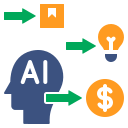Emerging AI Strategies in Digital Marketing
The rapid advancement of artificial intelligence is revolutionizing the digital marketing landscape, creating new opportunities for brands to connect with consumers in more personalized, efficient, and innovative ways. AI-driven technologies are enabling deeper data analysis, smarter automation, and innovative campaign management, fundamentally altering how marketers approach their craft. As AI continues to expand its capabilities, professionals in digital marketing must stay abreast of the latest trends and techniques to maintain a competitive edge. This page explores the most significant emerging AI strategies shaping digital marketing today, offering in-depth insights into how artificial intelligence transforms content creation, advertising, analytics, and customer engagement.
AI-Driven Content Creation
Predictive Analytics for Segmentation
Dynamic Ad Targeting
Behavioral Data Analysis
Smart Automation and Campaign Optimization
Real-Time Bid Management
Automated A/B Testing
Workflow and Scheduling Automation

AI-Powered Customer Engagement
Conversational AI and Chatbots
AI-Enhanced Email Marketing
Personalized Recommendations

Automated Insights Generation

Sentiment Analysis

Predictive Performance Analytics
AI in Social Media Marketing

